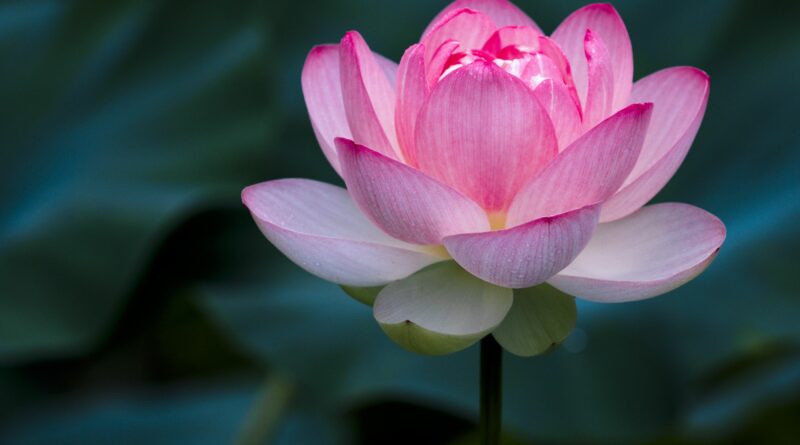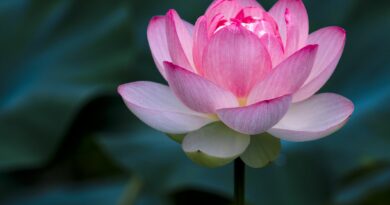Death Without Drama
Death Without Drama
March 2, 2018
There was a nice cartoon in The New Yorker recently: three hooded death figures with scythes, and one of them is lying dead on the ground. One of the other ones is saying to the third one, “You never think it’s going to happen to you.”
Most of us go through life like that. And yet death happens to everybody. Most people don’t like to think about it because they think there’s nothing you can do about it. They’re, you might say, fatalistic about fatality: You die, you just die, and that’s it. But the Buddha realized that there’s a skill to dying, because death is not the end. You can die well or die poorly, and how you manage your death is going to play a large role in what happens after death.
This is one of the reasons why we practice, one of the reasons why we contemplate the five reflections so often: We’re subject to aging, illness, death, and separation. These things are all inevitable. But then we have our kamma. That’s what makes a difference.
Now, for most us our kamma is that we want more, as in that other chant we did just now: The world is swept away, does not endure, offers no shelter, has nothing of its own, there’s no one in charge—and yet, we’re all slaves to craving. We want to keep coming back for more and more and more of being swept away. That’s the problem. But we can learn how to gain some control over that craving at least—and at best, of course, put an end to it.
Before we can put an end to it, though, we need to get some control over it. This is why we meditate, because there’s a skill in gaining control over the mind. The Buddha talks about the things you have to watch out for as death comes. There are two big ones. One is worry: your own worry about yourself, what you’re facing, along with your worries about the people you’re leaving behind.
The other thing you have to watch out for is sensuality: your attachment to planning for sensual pleasures, which leads to fear that you’ll be deprived of the pleasures you’ve enjoyed.
When we practice meditation, we’re learning how not to fall for these attachments. Regard them simply as hindrances coming up in the mind. No matter how insistent they may seem—that you really want a particular pleasure, that this is something you really have to worry about—you have to tell yourself you don’t need those things.
As for the best preparation for the future, it lies in gaining more discernment, more concentration, more mindfulness. You don’t know the details of what’s going to happen in the future, but you do know that when unexpected things come, the more mindful, alert, and discerning you are, then the more likely you’ll be able to handle these things well. And the more you’ll have the ability not to get knocked over by these events.
One of our biggest problems is the narratives we tell ourselves. And the narrative of death is a very upsetting one. But we don’t have to tell ourselves that narrative, or any other narrative. That’s another thing the practice does as we’re developing concentration. We start out by trying to be with just the body, feelings, and mind, in and of themselves, at the level before we turn them into issues, before we turn them into narratives.
The “in and of itself” is there before we turn these things into the ordinary becomings of daily life: what you want to do with this body; what kind of feelings you want; how you’re going to go about getting them; the attitudes that come up in the mind; the stories they tell. We try to get at our experience of the body, feelings, and mind before they’ve turned into becomings. When they’re still just a potential for a becoming with narratives, we turn them into a becoming with concentration, which doesn’t have narratives.
If you were to be asked, “What was the narrative of your concentration today?” the answer would be, “Well, I watched this breath, then I watched that breath, and then I watched that breath.” A pretty dull narrative. But the point is not in the narrative. You don’t have to remember all the breaths you’ve watched. You just have to remember to be with each one as it comes, and try to breathe in a way that’s skillful each time you breathe. Try to find whatever pleasure or potential for pleasure there can be in that breath. Give the mind something good to stay with so that it’s not hungering after any narratives.
It’s just the breath in and of itself, the body in and of itself—not the body in the world, where you might wonder about whether it’s good-looking or not, whether people will like it or not, whether it’s strong enough to do this or that job. Stay with just the fact that you’ve got a body right here. That’s it. It’s just a body. Feelings are just feelings. Mind states are just mind states, without all the fearful narratives. And that’s your refuge.
The Buddha talks about taking the Dhamma as a refuge and he explains it as establishing mindfulness in this way. It’s your refuge because it helps pull you out of the narratives that would make things overwhelming.
There’s a lot of drama that can happen around death, but death can also be without drama. You have that choice—and that’s the skill we’re trying to develop.
That’s the other part of meditating. There’s not much drama about sitting and watching your breath. Like that older New Yorker cartoon: A woman is talking to a friend. In the background, you see her husband in the next room, sitting and meditating. And she’s complaining to her friend: “Henry used to be such an interesting neurotic before he took up meditation.”
The meditation is much better for you than neurosis, but there’s no drama. There are people who live for the drama, but then the drama can overwhelm them. I know an author who wrote a book about infidelity on a large scale, a man who was very unfaithful to a lot of women. But then she found that her husband was cheating on her and she couldn’t take it, so she committed suicide. It’s one thing to like the drama just for the taste, as they say in Indian aesthetic theory, which describes how you’re not actually experiencing what the characters are experiencing, you’re just tasting their emotions at a distance, which makes them interesting and enjoyable. But then when things like that actually happen to you, the suffering can be immense and overwhelming.
That’s not what we want. We want to learn to keep the mind from being overwhelmed. The Buddha talks about feelings invading the mind and remaining. What he means is that the feelings overwhelm you. He trained himself so that he was not invaded by the feelings and he was not overwhelmed. They didn’t remain. A feeling would come and it would just slip away, like water off a duck’s back.
How do you do that? By developing this refuge of mindfulness.
The Buddha has an image of the practice being like a fortress. You’ve got mindfulness as the gatekeeper, who tries to remember to recognize unskillful thoughts and to keep them from coming into the fortress. Mindfulness has three functions altogether:
• One is remembering to stay alert in the present moment.
• Two is recognizing what’s coming up, learning to label things as skillful and unskillful. Rather than “my narrative,” it’s, “This is an unskillful thought of this particular variety.”
• And then three, once you recognize what variety it is, then you know what to do with it. You remember how to deal with unskillful thoughts in an effective way, and how to effectively give rise to skillful qualities. That’s what mindfulness does. It protects the fortress at the gate.
But if it happens to let somebody in, then you’ve got the soldiers inside, which stand for right effort, armed with knowledge of the Dhamma. In other words, if something unskillful does come into the mind, you remember what the Dhamma has taught about things like that, and you do your best to get rid of it.
Then you’ve got concentration, which is the food that keeps the soldiers and the gatekeeper strong. At the same time, the soldiers and the gatekeeper are protecting the stores of food. They don’t want the food to get stolen.
So these are the qualities that, working together, see you through. These are your protection.
The fortress itself has a foundation post, which is conviction. The conviction is that your actions really will matter, which is why we’re not fatalistic about fatality. When death comes, we know there is a skill to approaching it. The actions you’ve been developing, the skills you’ve been developing through your meditation, through your practice, will see you in good stead. As long as you have that conviction, you’ll work at getting more skillful in your actions, even up to your last breath.
Finally, discernment is the fortress wall. It’s covered with plaster so that the enemy can’t gain a foothold. The soldiers throw the enemy out and your discernment keeps them out. That’s your refuge.
But the key to all this is to get to things before they turn into the narratives of becoming that make events overwhelming. See that the body is just the body. This is what the body does. It’s going to die inevitably. We have to prepare for that, so that when the time comes, we’re not knocked out of line: “The time has come? Okay, this is what you do when the time has come. You’ve been preparing for this. It’s just body. It’s just feelings. It’s just mind states.” That way, the mind can go on to whatever opportunities it has created for itself through its kamma.
If you do it well, then you go to a place where you have more opportunities to practice, which could be the human realm, or it could be the realm of the devas. Sometimes you hear that it’s only in the human realm that people can practice the Dhamma, but that’s not true. Devas can practice, too, when they’re heedful. So, if any of those realms open up with an opportunity to practice and you’re not able yet to completely let go, go there, and it still counts as a skillful death.
So we’re working on these skills: seeing the hindrances as hindrances rather than as more interesting stories to follow; learning to develop our fortress inside with its gatekeeper, its soldiers, and its food. That way, even though we don’t look for death, when it happens to come, we’re ready for it. We can approach it with skill, realizing that our level of skill will make a huge difference.



